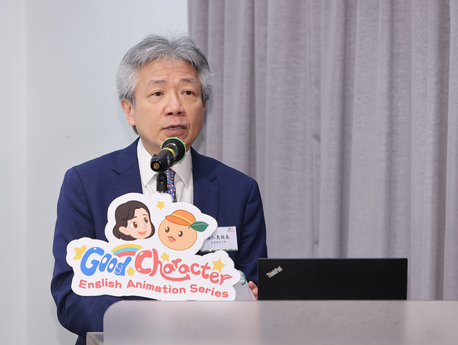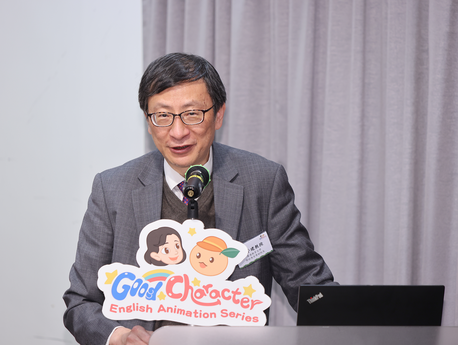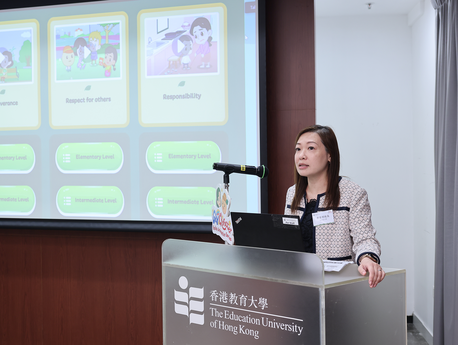EdUHK Launches English Animation Series to Cultivate Positive Values Among Students
The Education University of Hong Kong (EdUHK) held a launch ceremony today (31 March) for its ‘Good Character English Animation Series’, attracting an audience of over 100 English teachers and education professionals. The full animation series, along with its extended learning resources, has been uploaded to the project website (https://englearnwithfun.eduhk.hk/), and is free for the general public to access.
The project is under the ‘English Language Education for Students with Learning Diversity in Junior Primary’ Scheme. Leading the project is EdUHK Vice President (Academic) and Provost Professor John Lee Chi Kin (the project’s Principal Investigator), together with the Head of Department of English Language Education (ELE) Professor Michelle Gu Mingyue (Co-Principal Investigator). Also among the project team are Assistant Professor Dr April Liu Yiqi and Lecturer Mr Denis Wong Ka-ho from ELE.
The animation series encompasses 11 video stories in school settings, each six-minute long. These episodes feature a list of key vocabulary, referring to English textbooks commonly used in local primary schools, and corresponding to the curriculum of English language education at primary level. In addition, lesson plans and worksheets are available on the website, to provide diversified materials and interactive pedagogical strategies for teachers and parents’ reference.
EdUHK President Professor Stephen Cheung Yan-leung said, “Championing the idea of ‘pleasurable learning’, EdUHK believes a lively and interactive pedagogical approach can foster students’ learning interests. Given the fact that values education is of paramount importance to the holistic development of schoolchildren, the animation series represents an integration of English language learning and values education. Through the introduction of these related concepts to learners, we hope that they are able to develop positive traits.”
The series was developed along a framework which covers 10 priority values and attitudes, as set out by the Education Bureau*. They are: ‘Perseverance’, ‘Respect for others’, ‘Responsibility’, ‘National Identity’, ‘Integrity’, ‘Commitment’, ‘Care for others’, ‘Law-abidingness’, ‘Empathy’ and ‘Diligence’, while an additional theme of ‘Inclusion’ was also included. ‘Little Leaf’ – the main character in the series – has been created as an ideal learning peer for primary students to accompany them in exploring a variety of positive values and attitudes.
In the ‘National Identity’ episode, for instance, examples are drawn from ancient history to modern day, with a view to piquing students’ interest. These include the four great inventions of ancient China, the development of high-speed rail and the ‘Tiangong Classroom’ lecture series performed by the Shenzhou-13 crew.
Professor Lee explained why ‘Inclusion’ is chosen as one of the learning themes in the series. He said, “Hong Kong is a diverse community, in which students may meet people from different cultural backgrounds in their daily lives. Inclusion is an important value for students’ character development, and we hope that they can learn to respect one another and try to put themselves in the position of others. This will be immensely beneficial to their future growth.”
The Principal of Marymount Primary School Ms Brenda Lo Ka-ming delivered a keynote speech, which was followed by a panel discussion on how to make use of multiple pedagogical strategies to enhance English language learning among primary school students.
Co-chaired by Professor Gu and Dr Liu, the session was joined by Principal of EdUHK Jockey Club Primary School Ms Cheung Kam-yan; Principal of Shamshuipo Kaifong Welfare Association Primary School Ms Cheung Lai-wan; and English Teacher of Pat Heung Central Primary School Ms Cheung Ying-fong.
* In 2021, The Education Bureau announced the ‘Values Education Curriculum Framework (Pilot Version)’. Prepared by the Curriculum Development Council (CDC), the framework aims to provide schools with suggestions and exemplars for the planning of their school-based values education curriculum, within and beyond the classroom.
- Ends -
EdUHK Launches English Animation Series to Cultivate Positive Values Among Students
Download all images










